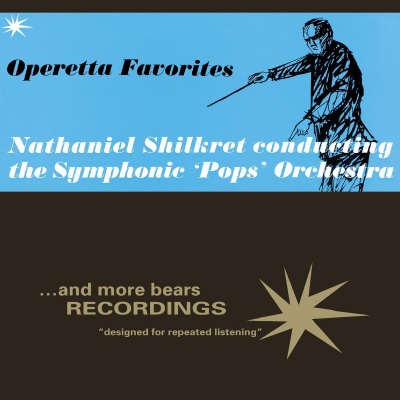
Operetta Favorites
The blissful union of music and words has brought forth abundant offspring. Opera is, of course, the most dignified and respectable in the lot, but no one should overlook her lighthearted younger sister, the operetta. Operetta plots may revolve around historical subjects or exotic lands and they may even be about everyday people – but never in real-life situations. For there is an aura of make-believe about the world of operetta, which is invariably gayer and more colorful than the world of reality. This idealized quality is one notable difference between the operetta and today’s musical comedy – the other is the decided predominance of music over the words. It follows inevitably that operetta, to be most effective, requires outstanding voices. In this program, the vibrant voices of the Broadway Opera Company recapture past operetta glories of Paris, Vienna and London. The scintillating sequence begins with the works of Jacques Offenbach (1819-1880), founder of the French school of opera-comique, whose witty and wicked creations so picturesquely reflected the satirical and sophisticated spirit of the Second Empire. The brisk Overture to ’The Drum Major’s Daughter,’ a work of 1879, is followed by three excerpts from ’La Perichole’, one of the best known Offenbach scores (1868), which recently entered into the repertoire of the Metropolitan Opera. Franz von Suppé (1819-1895), Offenbach’s contemporary, was an Italian of Belgian descent whose principal scene of activities was Vienna. A true mirror of this international flair, Suppé’s music has delighted three generations with a seemingly undimmed appeal. The sparkling highlights of ’Boccaccio’ (1879), one of Suppé’s best known operettas, give eloquent testimony to the composer’s buoyant spirit and to the infectious quality of his melodies. One of the most gifted among Offenbach’s successors in the realm of the French operetta was Jean Robert Planquette (1848-1903), a native and lifetime resident of Paris. He wrote about twenty operettas for the French musical stage and at least one of them, ’Les Cloches de Corneville‘ (1877), managed to win lasting popularity in the English speaking countries under the title of ’The Chimes Of Normandy.’ This is the operetta which is represented here in lilting renditions by the Broadway Opera Company. The program ends with a group of selections from Edward Jakobowski’s ’Ermine,’ an operetta first produced in London (1885) prior to its conquest of the American stage. Its Lullaby in particular,has long been a great favorite with American singers and vocal groups. The talented singers of the Broadway Opera Company under Maestro Shilkret’s baton include Saramae Endich and Yvonne Ciannella, sopranos; Beatrice Krebs, contralto; Jon Crain and John Druary, tenors and Jimi Beni and Raymond Keast, baritones.

